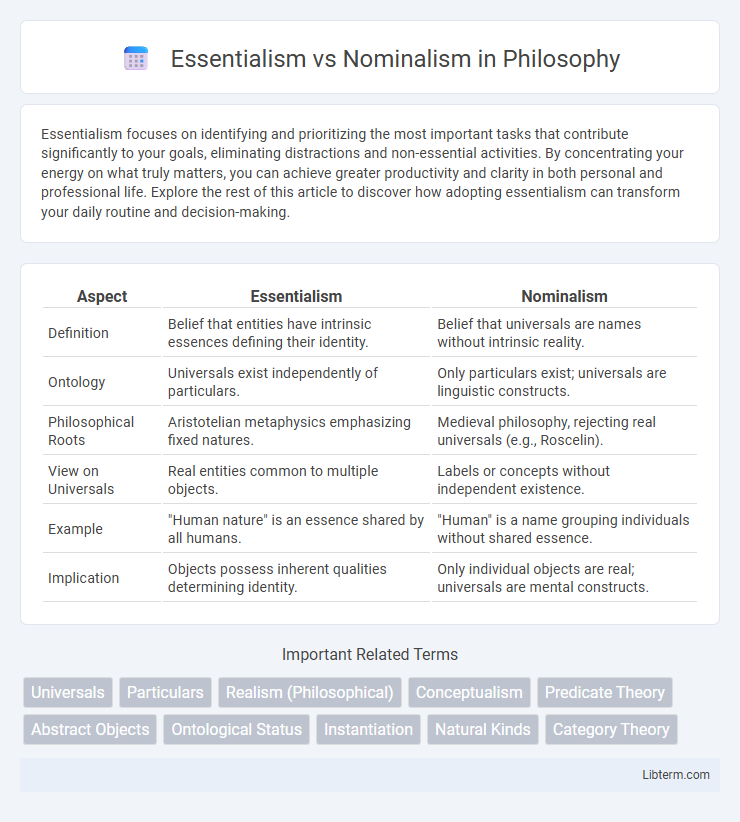Essentialism focuses on identifying and prioritizing the most important tasks that contribute significantly to your goals, eliminating distractions and non-essential activities. By concentrating your energy on what truly matters, you can achieve greater productivity and clarity in both personal and professional life. Explore the rest of this article to discover how adopting essentialism can transform your daily routine and decision-making.
Table of Comparison
| Aspect | Essentialism | Nominalism |
|---|---|---|
| Definition | Belief that entities have intrinsic essences defining their identity. | Belief that universals are names without intrinsic reality. |
| Ontology | Universals exist independently of particulars. | Only particulars exist; universals are linguistic constructs. |
| Philosophical Roots | Aristotelian metaphysics emphasizing fixed natures. | Medieval philosophy, rejecting real universals (e.g., Roscelin). |
| View on Universals | Real entities common to multiple objects. | Labels or concepts without independent existence. |
| Example | "Human nature" is an essence shared by all humans. | "Human" is a name grouping individuals without shared essence. |
| Implication | Objects possess inherent qualities determining identity. | Only individual objects are real; universals are mental constructs. |
Understanding Essentialism: Core Concepts
Essentialism posits that entities possess inherent, immutable characteristics defining their true nature, distinguishing them from accidental or non-essential features. Central to essentialism is the belief in universals or essences that exist independently of individual instances, providing a metaphysical foundation for categorizing objects and concepts. This framework contrasts with nominalism by emphasizing that these essences determine identity and classification, rather than names or labels alone.
Defining Nominalism: Key Principles
Nominalism asserts that universals and abstract concepts do not have an independent existence outside specific instances, emphasizing that only particular objects are real. It denies the existence of inherent essences, arguing that categories and general terms are mere names or labels created by human cognition. This philosophy contrasts with essentialism by rejecting the notion of fixed, intrinsic properties shared by members of a class.
Historical Roots of the Debate
Essentialism traces its roots to Plato's theory of Forms, where abstract, immutable essences define the true nature of things beyond their physical manifestations. Nominalism emerged during the late medieval period through thinkers like William of Ockham, who rejected universals as real entities, viewing them instead as mere names or linguistic constructs. The debate centers on whether universals exist independently (essentialism) or are dependent on human cognition and language (nominalism), shaping centuries of philosophical inquiry in metaphysics and ontology.
Major Philosophers and Their Positions
Plato championed Essentialism, asserting that universals are real, eternal forms existing independently of particulars. In contrast, William of Ockham defended Nominalism, arguing that universals are mere names without intrinsic reality beyond individual objects. Aristotle's moderate Essentialism posited that universals exist, but only within particular things as shared essences.
Essentialism in Metaphysics
Essentialism in metaphysics posits that objects possess inherent, unchanging essences defining their identity and properties. This viewpoint asserts that these essences exist independently of human perception and are necessary for categorizing and understanding reality. Essentialism contrasts with nominalism by emphasizing that universals or categories have real, objective existence rather than being mere names or linguistic constructs.
Nominalism’s Impact on Science and Language
Nominalism's rejection of universal essences reshaped scientific inquiry by emphasizing empirical observation and individual phenomena over abstract categories, driving advancements in experimental methods. In language, Nominalism promoted a focus on concrete terms and specific references, influencing semantic theory and the development of analytic philosophy. This shift facilitated clearer scientific communication by reducing reliance on metaphysical assumptions and prioritizing linguistic precision.
Comparing Real-World Applications
Essentialism influences real-world applications such as education and psychology by emphasizing inherent traits and fixed categories, guiding curricula and therapeutic approaches that assume stable characteristics. Nominalism shapes legal theory and linguistics by rejecting universal essences, promoting flexible interpretations and the classification of concepts based on human conventions and contextual usage. These contrasting frameworks affect decision-making processes, policy formulation, and knowledge organization across disciplines, highlighting the tension between fixed realities and constructed categories.
Critiques and Counterarguments
Essentialism faces critiques for its reliance on fixed, inherent properties that may oversimplify complex identities and phenomena, ignoring cultural and contextual variations. Nominalism counters by emphasizing that universals are mere names without independent existence, yet it struggles with explaining commonalities and shared traits effectively. Critics argue that nominalism's denial of objective essences leads to difficulties in grounding scientific and ethical principles, prompting ongoing debates about the nature of universality and individual identity.
Essentialism vs Nominalism in Modern Thought
Essentialism in modern thought asserts that entities possess inherent, immutable essences defining their identity and properties, while nominalism denies universal essences, viewing categories as mere linguistic conventions or labels without intrinsic reality. Contemporary debates often explore how essentialist perspectives influence identity politics, ontology, and metaphysics, contrasting with nominalist approaches that emphasize context, social constructs, and the fluidity of meaning. This tension shapes discussions in philosophy, cognitive science, and linguistics, reflecting broader questions about the nature of reality and classification.
Future Directions in the Essentialism-Nominalism Debate
Future directions in the Essentialism-Nominalism debate emphasize integrating cognitive science findings to refine understandings of category formation and universals. Advances in artificial intelligence and metaphysics suggest new frameworks for reconciling essential properties with nominalist skepticism about abstract entities. Emerging interdisciplinary research aims to develop hybrid models that capture the dynamic interplay between stability in essences and the fluidity of nominal classifications.
Essentialism Infographic

 libterm.com
libterm.com